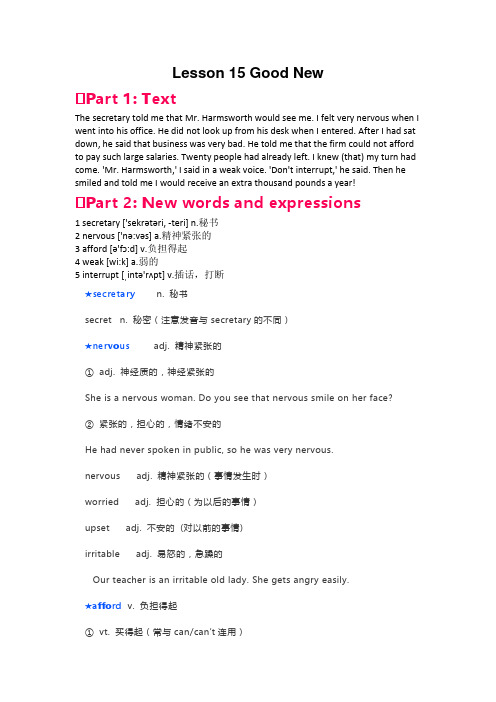新概念英语第二册第十五课课件Lesson15-good-news讲课教案
新概念英语第二册第十五课课件Lesson15_good_news

He is nervous.
• nervous ['nə:vəs] adj. 精神紧张 的 神经
• nerve [nə:v] n. 神经 • 短语:
• be nervous about • 对…. 感到紧张
• Eg: Are you nervous about the English exam?
直接引语(变化前) 现在进行时
间接引语(变化后) 过去进行时
“I’m making coffee for you all,” she She said she was making coffee
said.
for us all.
Grammer - 2 直接引语转换间接引语
2.6 转换中的要点总结2-时态的转换3
Grammer - 2 直接引语转换间接引语
转换中的要点总结2-时态的转换1
直接引语(变化前) 一般现在时
间接引语(变化后) 一般过去时
“I know it,” he said.
He said that he knew it.
Grammer - 2 直接引语转换间接引语
2.6 转换中的要点总结2-时态的转换2
He said, “I have been doing it for hours.”
He said he had been doing it for hours.
Grammer - 2 直接引语转换间接引语
2.6 转换中的要点总结2-时态的转换7
直接引语(变化前) 过去完成时
间接引语(变化后) 过去完成时
Eg:He interrupted me while I was speaking. Eg:You interrupted my thoughts.
新概念第二册第15课课件

03 句子结构与语法 分析
复杂句型解构
并列句
本课介绍了并列句的结构和用法,并列句由两个或两个以上的简单 句并列而成,常用并列连词连接。
复合句
本课详细讲解了复合句的结构和用法,复合句由一个主句和一个或 多个从句构成,从句可以是名词性从句、定语从句或状语从句。
特殊句型
本课还介绍了一些特殊句型,如倒装句、强调句等,这些句型在表达 上具有特殊的效果和用法。
新概念第二册第15课课件
目 录
• 课文背景及作者简介 • 词汇与短语解析 • 句子结构与语法分析 • 课文内容详解 • 阅读理解与写作技巧 • 练习与巩固
01 课文背景及作者 简介
课文背景介绍
01
02
03
课文来源
本文选自某知名杂志或文 集,是一篇具有代表性和 影响力的经典作品。
创作时间
本文创作于20世纪中期, 反映了当时的社会背景和 人们的思考方式。
阅读理解练习题
阅读下列短文,回答问题 选择最佳标题
根据短文内容判断正误 概括文章大意
答案及解析
提供所有练习题的答案
针对每道题目进行详细解析,包括解题思路、考点分析、易错点提示等,帮助学生更好地理解题目和 掌握相关知识点。
THANKS
感谢观看
There be句型与have/has句型的区别
本课详细分析了There be句型与have/has句型的区别,包括它们的使用场合、意义以 及与其他词语的搭配等。
祈使句与感叹句的异同
本课还对祈使句和感叹句的异同进行了比较,包括它们的结构、语气以及使用场合等。
04 课文内容详解
段落大意概括
第一段
01
时代背景与文学价值
新概念第二册第15课课件

THANKS
THANK YOU FOR YOUR WATCHING
02
03
略读技巧
教授学生如何快速浏览文 章,抓住文章大意,提高 阅读速度。
寻读技巧
训练学生如何在文章中快 速找到特定信息,如时间 、地点、人物等。
精读技巧
引导学生深入理解文章, 分析作者观点,评价文章 价值。
阅读理解题目解析
01
02
03
04
细节理解题
针对文章中的具体细节进行提 问,要求学生准确理解并回答
04
阅读理解与技巧提升
阅读材料选择与解读
选择具有代表性的文章
选择涉及不同领域的文章,如历史、科学、文化等,以拓宽学生 的阅读视野。
注重文章结构与逻辑
引导学生分析文章结构,理解段落间的逻辑关系,把握文章主旨。
解读重点词汇与短语
讲解文章中的重点词汇和短语,帮助学生理解文章细节。
阅读技巧分享与训练
01
实战演练二
写一篇记叙文,讲述自己 与家人或朋友之间发生的 一件感人至深的事情。
实战演练三
根据所给材料,编写一则 新闻报道。
优秀作品展示与学习
作品一览
展示若干篇优秀的学生作品,供 大家学习和借鉴。
亮点分析
对每篇优秀作品进行详细点评, 分析其优点和特色。
互动交流
邀请同学们分享自己的写作心得 和体会,促进相互学习与成长。
听力材料解读
引导学生先听后读,通过图片、文字等多种形式解读听力材料,帮助学生深入 理解听力内容。
听力技巧分享与训练
预测与推断
训练学生根据上下文、关键词等预测与推断听力内容的能力 ,提高听力理解的准确性。
速记与整理
教授学生有效的速记方法,如缩写、符号等,帮助学生快速 捕捉关键信息,提高听力记录的效率。
新概念第二册lesson15课件(精华版)

• Key words and expressions
New words and expressions
secretary [‘sekrətəri] n. 秘书
☆ secretary
----What does a secretary do? ----A secretary types letters. n. 秘书,(英)大臣,(美)部长 • a private secretary 私人秘书 • the Secretary of State (美)国务卿
Revision: Lesson 14 Do you speak English?
★Key structure: • 过去完成时(9AUnit5): 时间状语从句中,如果两个动作都发生在过去,同时发生, 要用过去进行时态;如果一先一后发生,先发生的动作用 过去完成时,后发生的动作用一般过去时。 ★Special difficulties: • ask & ask for • except & except for & besides & apart from • either of & neither of & both of & all of
Listening
• Listening to the story and try to find the answers to the following questions. 1 How did the writer feel when he was told to see his boss? 2 What did Mr. Harmsworth say about business? 3 How many people had left?
新概念第二册第15课课件pptx(2024)

分析
该句使用了被动语态,表 示“书”是“写”这个动 作的承受者。
模仿写作
The house was built in the 19th century.(这所 房子建于19世纪。)
20
05
听力训练及技巧指导
2024/1/28
21
听力材料预览
听前准备
了解听力材料的主题和背 景,预测可能涉及的内容 。
新概念第二册第15 课课件pptx
2024/1/28
1
目录
2024/1/28
• 课程介绍与背景 • 词汇与短语精讲 • 课文逐句解读与翻译 • 语法知识点梳理与运用 • 听力训练及技巧指导 • 口语表达能力提升途径探讨
2
01
课程介绍与背景
2024/1/28
3
本节课程目标
掌握本课的核心词汇和短语,能够熟练运用进行 01 日常交流。
2024/1/28
25
模仿对话练习设计
1
选取经典对话片段
从电影、电视剧、演讲等素材中,挑选出具有代 表性和启发性的对话片段供学生模仿。
2
分析对话技巧
引导学生关注对话中的语言运用、情感表达、语 音语调等要素,帮助他们理解并掌握有效的对话 技巧。
模仿练习
3
组织学生进行模仿练习,让他们在模拟真实场景 中运用所学技巧,提高口语表达的准确性和流利 度。
28
2024/1/28
THANKS
感谢观看
29
复习
定期复习本课的内容 ,结合笔记和练习进
行回顾和巩固。
2024/1/28
6
02
词汇与短语精讲
2024/1/28
7
重点词汇解析
新概念第二册第15课课件

02 03
避免文化冲突
了解不同国家的文化特点,可以避免在交流中产生不必要的误解和冲突 。例如,在某些国家,直接询问对方的收入或婚姻状况可能被视为不礼 貌,而在其他国家则可能被视为友好的表现。
使用适当的语言
在不同的文化背景下,相同的语言可能有不同的含义。因此,在跨文化 交际中,使用适当的语言是非常重要的。了解不同国家的文化和习俗, 可以帮助我们选择更恰当的表达方式。
语法解析
总结词:重点语法
详细描述:本课的语法重点为现在完成时态,通过例句和练习,让学生掌握该时态的用法和结构,如 “I have written a letter”表示我已经写了一封信。
课文内容翻译及讲解
总结词:课文精讲
详细描述:本课课文主要讲述了一封信的写作过程,包括准备信封、贴邮票、写明信片等环 节。通过讲解课文,让学生了解英文书信的基本格式和写作技巧,同时学习相关词汇和语法 。
听录音,填空
题目
听录音,完成填空。
内容
提供一段录音,内容涉及日常对话或短文,学生 需要填写录音中提到的关键词或短语。
示例
录音内容为关于旅行的对话,学生需要填写缺失 的地点名词。
听录音,回答问题
题目
听录音,回答问题。
内容
提供一段录音,内容涉及日常对话或短文,学生需要回答关于录音 内容的问题。
示例
录音内容为关于电影的讨论,问题为“What is the name of the leading actor?”。
助动词。
填空题3
完成下列对话,填写适 当的短语或句子。
填空题4
在所给段落中填入合适 的词语或短语,使文意
连贯。
阅读理解
阅读理解1
阅读以下短文,回答问题。
新概念英语第二册Lesson15 good news课件 (共47张PPT)

☆amusing adj.好笑的,有趣的
☆experience n.经历,经验
☆wave
v.招手
☆lift
n.搭便车
☆reply
v.回答
☆language n.语言
☆journey n.旅行
• an amusing experience • 一次有趣的经历
• last year
• 去年
• in the south of
A.works B.had worked C.will work D.has worked
3.I like___of the books, that is, I don't like___of the designs.
A.either;neither B.neither;one C.neither;either D.either;both
物理的;身体的 罚款 海报;招贴 做广告;登广告 光荣;荣誉 讨价还价;讲条件;便宜货 没有希望的;绝望的 愚蠢的;傻的 疼痛;痛苦 陆续地;一个接一个地 应受(报答或惩罚);值得 敲击者;(足球的)前锋
Revision:
Lesson 14 Do you speak English?
★Words and expressions:
了 ,谢 谢 参 考 。 尊 敬 的 各 位 家长: 各 位 家 长 下 午好!很 高 兴能 和这么 多的家 长坐在 一起来 共同的 讨论孩 子们的学习情 况 。 在 做 的 各位家 长呢,有 的我们 是经常 见面,在 一起沟 通过很 多了,有 的呢 ,我们仅 仅 是 一 面 之 缘,今天 在这里 ,不管是 经常见 面还是 一面之 缘,我 指向开 门见山 的说点 , 不 想 说 那 些 冠冕堂 皇的话 ,不想浪 费大家 的时间 ,在这大 热天里 ,我相 信各位 家长也 不 是 为 了 来 听我的 一些虚 伪奉承 的话而 坐在这 里,都是 为了我 们的孩 子的学 习而来
新概念英语第二册课件 (Lesson 15 Good news)

4) 现在完成时改为过去完成时: “I have just heard the news,” he said. = he said that he had just heard the news. 5) 一般过去时改为过去完成时: “I broke the window,” Tom said. = Tom said that he had broken the window.
vt.& vi. 打断
adj. 额外的
----What does a secretary do?
----A secretary types letters.
secretary n. 秘书,大臣,部长
a private secretary (美)国务卿 eg. Ban Ki-Moon, the secretary-general of United Nations, is delivering a speech. 联合国秘书长潘基文正在发表演说。 general ['dʒenrəl] n.上将; 常规 私人秘书
③ two more
eg. Give me two extra/other/more books.再给我两本书。 once more: 再一次
④ another three days 另外三天 (只有another 的数词在后面)
直接引语和间接引语
当我们要引用某人的话或想法时, 可以将
某人说的话一字不改的引用,这叫பைடு நூலகம்直接引语”。
in a loud (大声) voice
in a low (低声) voice
in a weak (强调心里不踏实) voice
in a strong (理直气壮) voice
新概念第二册第15课教案

Lesson 15 Good news 佳音news [nju:z] n.1. [u]消息;音信有什么最新消息吗?What’s the latest ([leitist]adj. 最近的;最新的) news?这真是好消息。
That’s great news.把你最近的情况全都告诉我。
Tell me all your news.你是想先听好消息还是坏消息?Do you want the good news or the bad news first?一条/一则消息 a piece/bit of news2. [u]媒体对重要事情的报道;新闻e.g. 国内/国际新闻 national/international news她老上报纸。
She is always in the news.3. (the news) (电视或广播中的)新闻节目e.g. 收听/收看新闻节目 to listen to / watch the news九点的新闻报道 the nine o’clock news4. [u]新闻人物;新闻事件e.g. 流行音乐明星们总是新闻人物。
Pop stars are always news.1. be bad news (for sb./sth.)对…不利e.g. 中央供暖系统可能不利于室内植物。
Central heating is bad news for indoor plants.2. break the news (to sb.)最先(向…)透露坏消息;说出实情3. be good news (for sb./sth.) 对…有利(或有益处)4. no news is good news (saying)没有消息就是好消息单词讲解1、secretary ['sekrətəri] n.秘书secret ['si:krit] n. 秘密tell a secret 告诉一个秘密keep a secret 保守秘密the secret of success 成功的秘密an open secret 一个公开的秘密in secret 秘密地secret adj. 秘密地,保密的,不公开的a secret marriage 一次秘密的婚礼 a secret document 一份秘密的文件secretive ['si:krɪtɪv] adj. 喜欢保守秘密的,守口如瓶的eg. He is rather secretive about his personal problems. 他对自己的个人问题守口如瓶。
新概念2第15课PPT——含丰富的教学设计

cold
bad
afraid
hot
happy
strange
young
hungry
1.Who is Mr. Harmsworth? 2.How does the writer feel today? 3.What did Mr. Harmsworth say about the busiNews
★weak adj. 弱的 in a weak voice ★interrupt v. 插话,打断 (n.)interruption It is impolite to interrupt others .
What do they look?
They’re/look tired
tired How do you feel today? sad good horrible
What do you think of the writer?
would secretary The ________ told me that Mr. Harmsworth _____ went nervous see me. I felt very _______when I _____ into his office. from entered He did not look up _____ his desk when I ______. business After I had sat down, he said that ________ was very could bad. He told me that the firm _____ not afford to pay such Twenty _____ large salaries. ______ people had already left. I my knew that _____ turn had come. in I said _____ a weak voice: “ Mr. Harmsworth.” But smiled interrupt him. Then he _____ and he told me not to _________ receive told me I would ______ an extra thousand pounds a _____ year!
新概念英语第二册第十五课PPT课件Lesson 15 Good news

Lesson 15 Good news
Grammar
二、直接引语转换成间接引语的规则 1.人称代词的变化 人称代词的变动要根据语境及转述人的不同作相应变化,一般情况下,与汉语中
的变化相同。可记住一个口诀:“一主、二宾、三不变”。即第一人称按照主句 中的主语变化,第二人称按照主句中的宾语变化,第三人称一般不要变化。如:
He said,
“I am glad to see you.”
He said that
he was glad to see me.
“Do you know the man over there?” Mary said to Tom.
Mary asked Tom if he knew the man over there.
Lesson 15 Good news
Read the passage and answer the following questions. 1. Who wanted to see you?
Mr. Harmsworth wanted to see me. 2. How did you feel about this?
‘Don’t interrupt,’ he said.
Then he smiled and told me that I would receive an extra thousand pounds
a year!
PLAY
Lesson 15 Good news
Grammar 直接引语 VS 间接引语 引用或转述别人说的话时,采用两种形式:一是一字不改地将别人的话加以引用, 这叫直接引语;二是用自己的话加以转述,这叫间接引语。一般来讲,直接引语 须放在引号内,间接引语不必用引号,而且多用宾语从句的形式表达。例如:
新概念2第15课ppt课件

新概念英语分为四册,难度逐渐递增,适合不同 03 水平的学习者使用。
第15课主题及背景
01 第15课的主题为“A Noble Gangster”,讲述了 一个关于黑帮老大改过自新的故事。
02 故事背景设定在20世纪初的英国,反映了当时社 会的黑暗面和人性的复杂性。
会参与。
情景对话模拟练习
示范对话
教师提供一段情景对话的 示范,让学生了解对话的 基本结构和表达方式。
学生模拟练习
学生在小组内模拟情景对 话,可以根据自身经历或 想象进行创作,教师巡回 指导。
表演与评估
选择几组学生进行表演, 其他同学和教师进行评估, 提出建议和意见。
口语表达技巧指导
语音语调
指导学生正确发音, 注意重音、连读和语 调的变化,使口语表 达更自然流畅。
02
跨地域交流成为可能
借助手机、电子邮件、社交媒体等工具,我们可 以与世界各地的人进行即时交流。
文章内容深入探讨
• 提高工作效率:现代科技如电脑、软件等可以大大提高我们的工作效率和准确性。
文章内容深入探讨
沉迷虚拟世界
过度使用科技产品可能导 致人们沉迷于虚拟世界, 忽视现实生活。
人际关系淡化
过度依赖科技可能导致人 们面对面交流的能力下降, 人际关系淡化。
本节课重点内容总结
动词时态和语态的深入讲
01 解
现在完成时与过去完成时
03 的区别和应用
情态动词的基本用法和表
02 达
宾语从句和定语从句的复
04 习与巩固
学生自我评价报告
对于动词时态和语态的理 解更加深入,能够准确运 用不同时态和语态表达意 思
新概念英语第二册lesson15.Good-news讲课稿

nervous
The exam is coming, so I feel very nervous. adj. 担忧的,紧张的
当我走进他的办公室时,我感到很紧张。 I felt very nervous when I went into his office. The old woman felt nervous as she tried to cross the busy road. 这位老太太穿过拥挤的马路时感到很紧张。 Don’t be nervous! 别紧张!
afford
I have a lot of money, so I could afford an apartment. v. 买得起,经受得住,承担得起 I couldn’t afford a holiday this summer because I don’t have any time. 今年夏天我无法度假因为时间不够。 We can’t afford to pay such a price. 我们付不起这个价钱。
extra
adj. 额外的 extra time 加时赛 extra work 额外工作 I think they didn’t want any extra help. 我想他们不需要额外帮助。 extra pay for extra work 额外工作的额外报酬
What was the good news?
interrupt
stop sb. speaking, break in/ cut in v. 中断,打岔,插嘴
别打断我。 Don’t interrupt me. Traffic in the city was interrupted by a snowstorm. 市内交通被暴风雪所阻断。 It is rude to interrupt. 打断别人的话是不礼貌的。
新概念英语第二册+Lesson+15+Good+New+讲义

Lesson 15 Good NewPart 1: TextThe secretary told me that Mr. Harmsworth would see me. I felt very nervous when I went into his office. He did not look up from his desk when I entered. After I had sat down, he said that business was very bad. He told me that the firm could not afford to pay such large salaries. Twenty people had already left. I knew (that) my turn had come. 'Mr. Harmsworth,' I said in a weak voice. 'Don't interrupt,' he said. Then he smiled and told me I would receive an extra thousand pounds a year!Part 2: New words and expressions1 secretary ['sekrətəri, -teri] n.秘书2 nervous ['nə:vəs] a.精神紧张的3 afford [ə'fɔ:d] v.负担得起4 weak [wi:k] a.弱的5 interrupt [ˌintə'rʌpt] v.插话,打断★secretary n. 秘书secret n. 秘密(注意发音与secretary的不同)★nervous adj. 精神紧张的①adj. 神经质的,神经紧张的She is a nervous woman. Do you see that nervous smile on her face?②紧张的,担心的,情绪不安的He had never spoken in public, so he was very nervous.nervous adj. 精神紧张的(事情发生时)worried adj. 担心的(为以后的事情)upset adj. 不安的(对以前的事情)irritable adj. 易怒的,急躁的Our teacher is an irritable old lady. She gets angry easily.★afford v. 负担得起①vt. 买得起(常与can/can’t连用)afford sth.I can afford the coat.②vt. 担负得起(损失、后果等),花得起(时间)(常与can/can’t连用)afford money/timeI can afford the hoilday. (有时间去)I can afford five yuan.I can only afford one week for the trip.afford to do sth.I can’t afford to be ill again. 我不能再病了。
新概念英语第二册课件Lesson15(共23页)

New Concept English 2
8.“Mr. Harmsworth,” I said in a week voice.
in a weak voice 用微弱的声音说;
in a low voice 低声地说;
in a loud voice 大声地说;
New Concept English 2
• 一千英镑 a thousand pounds • 两千英镑 two thousand pounds • 额外的一千英镑 an extra thousand pounds • 额外的两千英镑 two extra thousand pounds • 数词+extra+名词 “额外的...”
• Please give me two extra ice-creams.
• 1.He is s__u_c_h_a good student that we all like him. • 2.He is _s_o____good a student that we all like him. • 3.It was s__u_c_h__bad weather that he had to stay at
I don't want to _in_t_e_r_r_u_p_t_you. Go on with your story.
1.She works as a ______(秘书)in a big company.
2.I looked ____ the book,and didn’t find the headline. A at B down C up D from
See ook up 往上看;查找 • look down 往下看
• He looked up (from his book) when he heard a noise.
Lesson 15 Good news(课件)新概念英语第二册 (3)

– 2.中断;遮断;阻碍 The war interrupted the trade between the
two countries. 战争使两国间的贸易中断了。
New Word - 6
• The secretary told me that Mr. Harmsworth would see me.
I felt very nervous when I went into his office. • The old woman felt nervous as she tried to cross
the busy road. 这位老太太穿过拥挤的马路时感到很紧张。 • Don’t be nervous! 别紧张!
Chapter1: Text Reading
Chapter2: New Word
Chapter4: Exercise
Chapter3: Grammar
Lesson 15 Good news
The secretary told me that Mr. Harmsworth would see me. I felt very nervous when I went into his office. He did not look up from his desk when I entered. After I had sat down, he said that business was very bad. He told me that the firm could not afford to pay such large salaries. Twenty people had already left. I knew that my turn had come.
- 1、下载文档前请自行甄别文档内容的完整性,平台不提供额外的编辑、内容补充、找答案等附加服务。
- 2、"仅部分预览"的文档,不可在线预览部分如存在完整性等问题,可反馈申请退款(可完整预览的文档不适用该条件!)。
- 3、如文档侵犯您的权益,请联系客服反馈,我们会尽快为您处理(人工客服工作时间:9:00-18:30)。
你应该在字典上查一下这个单词。
You should look the word up in the dictionary.
▪ Extra [adj]额外的 ▪ The football match went into extra time .
▪ Secretary General of the United Nations ▪ president
He is nervous.
▪ nervous ['nə:vəs] adj. 精神紧张的 神经
▪ nerve [nə:v] n. 神经 ▪ 短语:
▪ be nervous about ▪ 对…. 感到紧张
▪ =The secretary said, ‘Mr. Harmsworth will see you.’ 直接引语。
▪ Eg: The man said to me that I was a bastard.
▪ --The man said, ‘ You are a bastard’.
▪ 2、I felt very nervous when I went into his office.
听音频回答问题
▪ 1. What did the secretary tell the writer? ▪ That Mr. Harmsworth would see the writer. ▪ 2. Where did the writer go? ▪ To his office. ▪ 3. How did the the writer feel when he went in? ▪ Very nervous. ▪ 4. What did Mr.Harmsworth say about the
▪ =He said, ‘Business is very bad.’ 直接引 语。
▪ 5、He told me (that) the firm could not afford to pay such large salaries. 间接引语。
▪ =He said, ‘The firm can not afford to pay such large salaries.’ 直接引语。
Lesson 15 Good News
▪ secretary ['sekrətəri] n. 秘书 ▪ Secret ['si:krit] n. n. 秘密 ▪ 短语 ▪ Tell a secret 说出一个秘密 ▪ Keep a secret 保守秘密
▪ A secretary of state ▪ 国务卿
中断之事 ▪ Eg: It is impolite to interrupt others .
Eg:He interrupted me while I was speaking. Eg:You interrupted my thoughts.
Look up
a) 抬头
我抬起头来看时,见到有学生静静地看着我。
▪ Eg: The students answer ▪ the teacher in a week ▪ Voice.
weak弱的
Strong强的
stop or make a break
▪ interrupt [,intə'rʌpt] v. 插话,打断 ▪ Interruption [,intə'rʌpʃən] n. 中断;干扰;
▪ Eg: Are you nervous about the English exam?
▪ afford [ə'fɔ:d] v. 负担得起 ▪ afford sth. ▪ Eg:I can afford the car.我买得起这辆车
▪ weak [wi:k] adj. 弱的
▪ in a weak voice . adv. ▪ 声音很弱地
Lead-In
▪ 1. Have you ever felt nervous? What makes you nervous?
▪ 2. What would you do with an extra 1000 yuan a year?
▪ 3. Try go imagine, if you are required to see your boss or your el about that?
business? ▪ That is was very bad. ▪ 5. How many people had already left? ▪ Twenty. ▪ 6. What was the good news?
课文精讲
▪ 1、The secretary told me (that) Mr. Harmsworth would see me. 间接引语
▪ afford 负担 → ▪ Afford to do sth. 负担得起 ▪ 例句:We cannot afford this car. She
can’t afford to send his son to college.
▪ 6、Twenty people had already left (the firm). 过去完成时。
▪ 解雇:fire → 被解雇 be fired
▪ =Twenty people had already been fired.
▪ 主+系+表
▪ 3、He did not look up from his desk when I entered.
▪ Look up from 从………抬头看。 ▪ 例句:He looked up from the newspaper
when someone called him.
▪ 4、After I had sat down, he said (that) business was very bad. 过去完成时。间接 引语。
